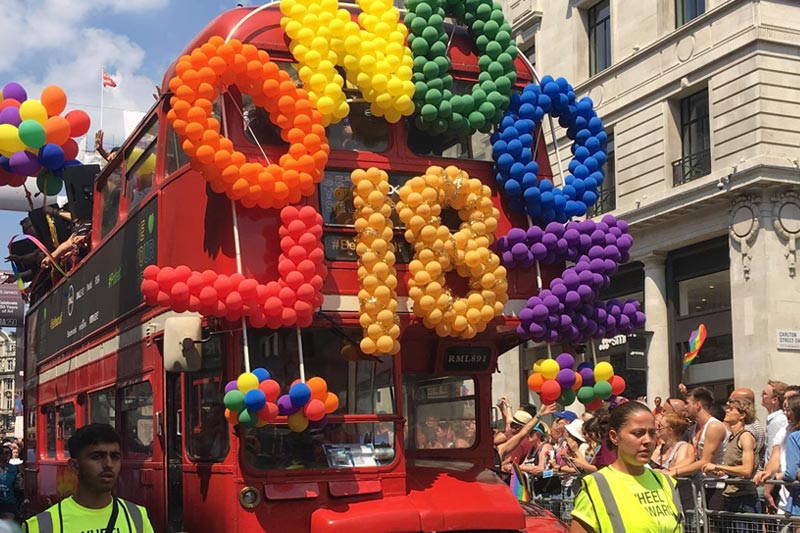Identity-Based Resources for Study Abroad: LGBTQIA+ Students
London Pride, summer 2018 | photo by Laura Austin, ’21
As a Meredith College student considering study abroad, you may already identify as LGBTQIA+ or you may still be exploring your identity. Whatever the case may be, it is important to recognize that cultural norms, laws, and local attitudes towards LGBTQIA+ people differ widely around the world. LGBTQIA+ students at Meredith have had success studying abroad safely for generations and the OIP is here to help future students prepare.

London Pride, summer 2018 | photo by Laura Austin, ’21
While many countries and societies accept and celebrate LGBTQIA+ culture and individuals, homophobia and transphobia exist abroad just as they do in the United States. Laws, customs, and social attitudes regarding sexual orientation, identity, and gender expression may differ from country to country, and these factors may impact LGBTQIA+ students’ safety and decisions as they travel abroad.
LGBTQIA+ students preparing to study abroad should do research on their host country’s laws and/or protections for LGBTQIA+ individuals. While some countries protect the LGBTQIA+ community’s rights by law, other countries have laws that make it a crime to openly identify as LGBTQIA+. In other countries, there are no laws meant to protect individuals from gender- or sexuality-based hate crimes.
Researching the general attitudes of your host country toward LGBTQIA+ individuals can help you prepare to study abroad. You may find that you can be just as open, or more so, about your identity abroad as you are in the United States, or you may find that laws or customs in your host country warrant more caution. With this knowledge, you will be better equipped to make decisions about which countries are the best fit for your study abroad experience.
Understanding how your sexuality or gender identity may impact your time on a study abroad program will allow you to be prepared for your travel, stay safe, and remain authentic to yourself and your identity.
In addition to safety concerns originating from the host culture, it is also important to consider how you may react if homophobia, transphobia, or heteronormativity come from within your study abroad group. You have the agency to decide how you’d like to approach these situations while maintaining your mental well-being throughout your program. If you ever encounter homophobia, transphobia, or other threats to your safety from the outside community or within your group, please do not hesitate to connect with your study abroad faculty or the OIP directly.
Questions to Consider
- Are there any laws regarding sexuality or gender identity in my host country? If so, are these laws beneficial to the LGBTQIA+ community or do they put LGBTQIA+ individuals in danger?
- What are typical attitudes toward the LGBTQIA+ community in my host country? Do these attitudes, along with any laws in the country, make this a safe location to study abroad?
- While it’s important to research potential challenges, have I considered how studying abroad may provide the opportunity to affirm my identities? Are there opportunities to patronize local LGBTQIA+-owned businesses or connect with the local community?
- In what ways do I nurture joy and pride here at home (i.e. artistic expression, writing, connection with local communities, etc.)? Is there a way for me to continue those forms of self-care abroad?
- How visible and/or large is the LGBTQIA+ community in my host country?
- Are there resources available for members of the LGBTQIA+ community in my host country?
- Is it safe to be out in my host country? Are there any cultural or behavioral norms for individuals within the LGBTQIA+ community that are different from those in the U.S.?
- What are the cultural norms for dating and friendship?
Additional Considerations
Before you depart, it will be vital to research what kind of legal rights LGBTQIA+ people have in your host country. As mentioned above, in some countries homosexuality is illegal or there are strict societal standards for showing affection in public. Always put your safety first and familiarize yourself with the laws and customs of your host country.
It may also be useful to research your host country’s terms or definitions used to talk about LGBTQIA+ issues and find in-country resources and support networks for LGBTQIA+ people. IES Abroad, Diversity Abroad, and Northwestern University have excellent destination guides that can help you learn more about your host country.
Additionally, regardless of your identity, understand that there may be LGBTQIA+ students in your study abroad group and among the local people you interact with abroad. While some may be “out” and some may not be, all individuals deserve the same respect. Understanding the diversity of experiences that there will be within your own group and the local population will only enhance your time abroad.
Resources
- IES Country-Specific Identity Resources
- Paris Gay Village | An association that brings together LGBTQ+ community members
- Pride in London | A home for every part of London’s LGBT+ community
- Gay-Friendly Rome
- Country-Specific Identity Information | Northwestern University
- LGBTQIA+ & Ally | IES Abroad
- LGBTQIA+ – Study Abroad | NC State University
- LGBTQ+ Students Abroad | Diversity Abroad
- LGBTQI+ Travel Guide | GoAbroad.com
- LGBTI+ Traveler Information | U.S. Department of State
- Airport Security | National Center for Transgender Equality


